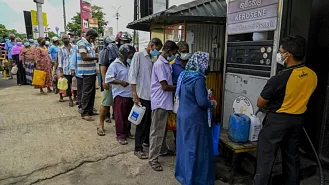“Sri Lanka’s New Government to Shrink the State Amid Economic Crisis”


Sri Lanka, reeling from a severe economic crisis, has announced plans to downsize the state under its new administration. Facing one of the worst financial crises in the country’s history, the government is taking drastic steps to reduce the size of the public sector and streamline its operations. This move comes as part of an effort to stabilize the economy, manage debt, and address the nation’s fiscal challenges.
State Downsizing and Economic Reform
The new administration, led by President Ranil Wickremesinghe, has emphasized the need for fiscal discipline and long-term economic reforms. In a bid to reduce government spending and alleviate mounting debt, Sri Lanka will begin a process of downsizing state-owned enterprises and cutting public sector expenditures. The government aims to make the state more efficient, focusing on key areas such as infrastructure, healthcare, and education while reducing non-essential services.
The decision to shrink the state is also part of an agreement with the International Monetary Fund (IMF) for a bailout package. As part of the IMF’s conditions, Sri Lanka must implement economic reforms, including reducing its public sector size, restructuring state-owned enterprises, and increasing taxes to generate revenue. These measures are expected to help stabilize the country’s finances in the long run but are also likely to result in job cuts and reduced government services.
Public Reaction and Social Impact
The announcement of these reforms has sparked mixed reactions across the country. While some view the decision as a necessary step to restore economic stability, others are concerned about the social impact, particularly the potential loss of public sector jobs. Sri Lanka’s public sector is a major employer, and reducing its size could lead to significant unemployment, particularly in rural areas where government services are vital to daily life.
Social groups have also expressed concerns about the potential impact on healthcare and education services, which have already been under strain due to the economic crisis. There are fears that further reductions in government spending could worsen access to essential services for the country’s most vulnerable populations.
Future Prospects and Challenges
Sri Lanka’s ability to navigate through this crisis will depend largely on the successful implementation of these reforms and the government’s ability to attract foreign investment. As the country works toward economic stabilization, international support, particularly from the IMF and other financial institutions, will be crucial in ensuring the sustainability of the reforms.
However, the government faces a delicate balancing act: while reducing the state’s size is seen as necessary for fiscal health, it must also address the social consequences of such austerity measures. The coming months will be critical in determining whether these reforms can lead Sri Lanka to a path of recovery or deepen the hardships faced by its citizens.
Conclusion
Sri Lanka’s new government is taking bold steps to shrink the state in an effort to stabilize its economy amid a severe crisis. While the downsizing of the public sector is a necessary move for long-term economic recovery, it raises concerns about the social and economic impact on the population. The coming period will reveal whether these reforms can succeed in restoring fiscal stability without causing further hardship for Sri Lankans.
Recent Posts
Ether Surpasses 2021 Record Following Powell’s Rate Cut Hints
Ether's price surged past its 2021 record after Jerome Powell's speech hinted at potential rate…
Understanding the Federal Reserve’s Impact on Retirees’ Financial Security
Explore how the Federal Reserve's policies affect retirees and the broader economy, ensuring financial stability…
Federal Reserve Chair Candidate Interviews to Begin After Labor Day
Treasury Secretary Scott Bessent confirms interviews for Federal Reserve chair candidates will start post-Labor Day,…
Walmart and Competitors Reveal Earnings Amid Rising Tariff Impact
Walmart and rivals report earnings, highlighting tariff effects on consumer prices. Insights on market trends…
Financial Challenges Facing Seniors: Navigating a Tight Budget
Explore the financial struggles seniors face on limited incomes and discover strategies for effective budgeting…
U.S. Stock Futures Rise Ahead of Fed Meeting After Trump-Putin Summit
U.S. stock futures see slight gains following the Trump-Putin summit as investors prepare for the…